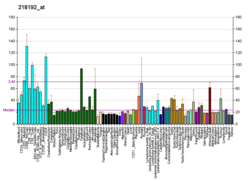Inositol hexakisphosphate kinase 2 is an enzyme that in humans is encoded by the IP6K2 gene.
This gene encodes a protein that belongs to the inositol phosphokinase (IPK) family. This protein is likely responsible for the conversion of inositol hexakisphosphate (InsP6) to diphosphoinositol pentakisphosphate (InsP7/PP-InsP5). It may also convert 1,3,4,5,6-pentakisphosphate (InsP5) to PP-InsP4 and affect the growth suppressive and apoptotic activities of interferon-beta in some ovarian cancers. Alternative splicing results in multiple transcript variants encoding different isoforms.
References
- ^ GRCh38: Ensembl release 89: ENSG00000068745 – Ensembl, May 2017
- "Human PubMed Reference:". National Center for Biotechnology Information, U.S. National Library of Medicine.
- "Mouse PubMed Reference:". National Center for Biotechnology Information, U.S. National Library of Medicine.
- Saiardi A, Erdjument-Bromage H, Snowman AM, Tempst P, Snyder SH (May 2000). "Synthesis of diphosphoinositol pentakisphosphate by a newly identified family of higher inositol polyphosphate kinases". Curr Biol. 9 (22): 1323–6. doi:10.1016/S0960-9822(00)80055-X. PMID 10574768. S2CID 15311443.
- ^ "Entrez Gene: IHPK2 inositol hexaphosphate kinase 2".
Further reading
- Andersson B, Wentland MA, Ricafrente JY, et al. (1996). "A "double adaptor" method for improved shotgun library construction". Anal. Biochem. 236 (1): 107–13. doi:10.1006/abio.1996.0138. PMID 8619474.
- Yu W, Andersson B, Worley KC, et al. (1997). "Large-scale concatenation cDNA sequencing". Genome Res. 7 (4): 353–8. doi:10.1101/gr.7.4.353. PMC 139146. PMID 9110174.
- White KE, Econs MJ (1998). "Localization of PiUS, a stimulator of cellular phosphate uptake to human chromosome 3p21.3". Somat. Cell Mol. Genet. 24 (1): 71–4. doi:10.1007/BF02677496. PMID 9776982. S2CID 22338269.
- Saiardi A, Caffrey JJ, Snyder SH, Shears SB (2000). "The inositol hexakisphosphate kinase family. Catalytic flexibility and function in yeast vacuole biogenesis". J. Biol. Chem. 275 (32): 24686–92. doi:10.1074/jbc.M002750200. PMID 10827188.
- Morrison BH, Bauer JA, Kalvakolanu DV, Lindner DJ (2001). "Inositol hexakisphosphate kinase 2 mediates growth suppressive and apoptotic effects of interferon-beta in ovarian carcinoma cells". J. Biol. Chem. 276 (27): 24965–70. doi:10.1074/jbc.M101161200. PMC 2025680. PMID 11337497.
- Saiardi A, Nagata E, Luo HR, et al. (2001). "Identification and characterization of a novel inositol hexakisphosphate kinase". J. Biol. Chem. 276 (42): 39179–85. doi:10.1074/jbc.M106842200. PMID 11502751.
- Morrison BH, Bauer JA, Hu J, et al. (2002). "Inositol hexakisphosphate kinase 2 sensitizes ovarian carcinoma cells to multiple cancer therapeutics". Oncogene. 21 (12): 1882–9. doi:10.1038/sj.onc.1205265. PMC 2043497. PMID 11896621.
- Strausberg RL, Feingold EA, Grouse LH, et al. (2003). "Generation and initial analysis of more than 15,000 full-length human and mouse cDNA sequences". Proc. Natl. Acad. Sci. U.S.A. 99 (26): 16899–903. Bibcode:2002PNAS...9916899M. doi:10.1073/pnas.242603899. PMC 139241. PMID 12477932.
- Ota T, Suzuki Y, Nishikawa T, et al. (2004). "Complete sequencing and characterization of 21,243 full-length human cDNAs". Nat. Genet. 36 (1): 40–5. doi:10.1038/ng1285. PMID 14702039.
- Gerhard DS, Wagner L, Feingold EA, et al. (2004). "The status, quality, and expansion of the NIH full-length cDNA project: the Mammalian Gene Collection (MGC)". Genome Res. 14 (10B): 2121–7. doi:10.1101/gr.2596504. PMC 528928. PMID 15489334.
- Nagata E, Luo HR, Saiardi A, et al. (2005). "Inositol hexakisphosphate kinase-2, a physiologic mediator of cell death". J. Biol. Chem. 280 (2): 1634–40. doi:10.1074/jbc.M409416200. PMID 15533939.
- Rual JF, Venkatesan K, Hao T, et al. (2005). "Towards a proteome-scale map of the human protein-protein interaction network". Nature. 437 (7062): 1173–8. Bibcode:2005Natur.437.1173R. doi:10.1038/nature04209. PMID 16189514. S2CID 4427026.
- Morrison BH, Bauer JA, Lupica JA, et al. (2007). "Effect of inositol hexakisphosphate kinase 2 on transforming growth factor beta-activated kinase 1 and NF-kappaB activation". J. Biol. Chem. 282 (21): 15349–56. doi:10.1074/jbc.M700156200. PMC 2048714. PMID 17379600.
See also
This article on a gene on human chromosome 3 is a stub. You can help Misplaced Pages by expanding it. |


